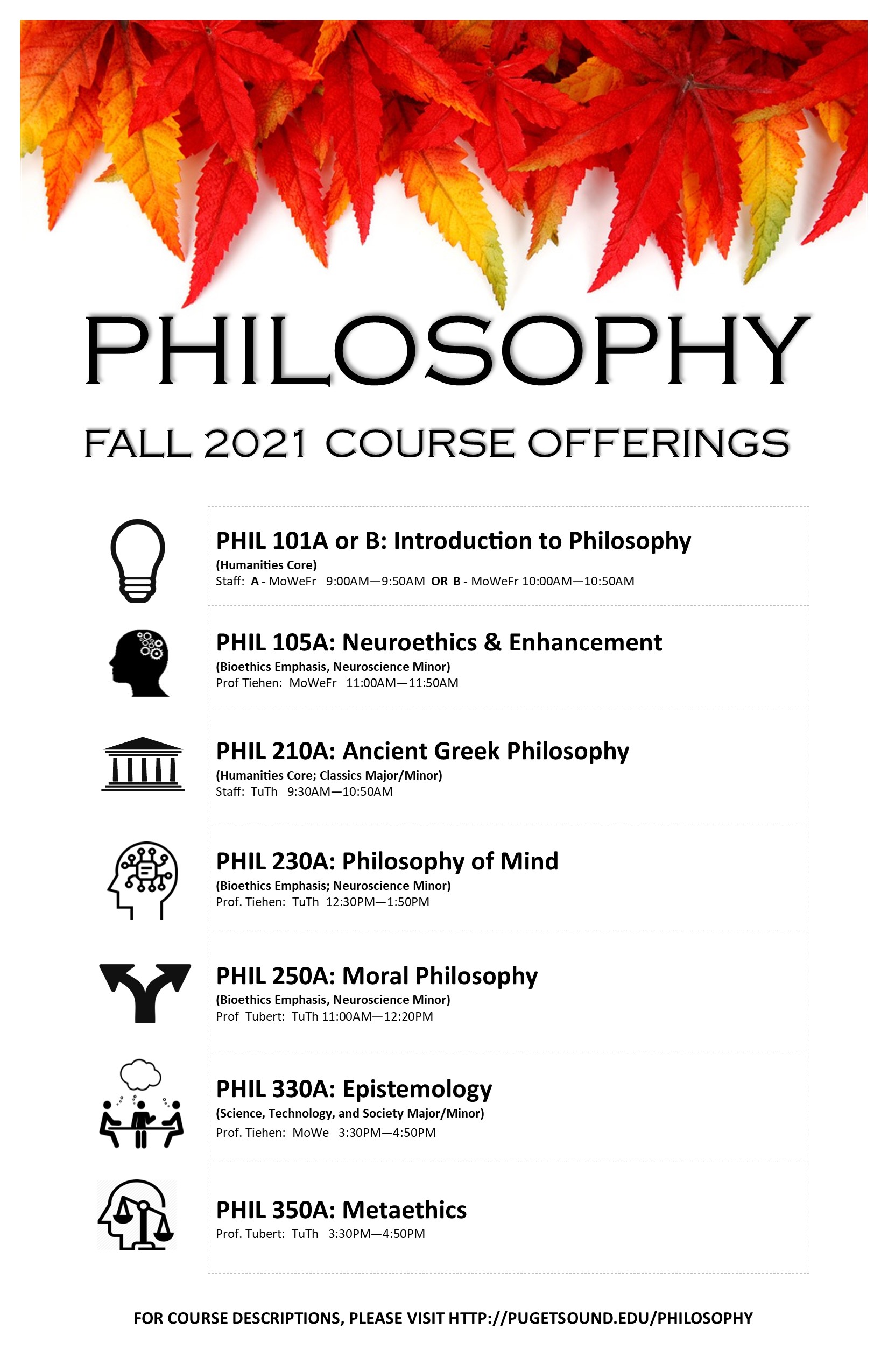
Descriptions for Fall 2021 Philosophy Courses
PHIL 101A or 101B – Introduction to Philosophy (Humanities Core)
Staff: (A) MoWeFr 9 – 9:50 a.m. OR (B) MoWeFr 10 – 10:50 a.m.
Representative philosophical topics, such as mind and body, the grounds of knowledge, the existence of God, moral obligation, political equality, and human freedom, are discussed in connection with contemporary philosophers and figures in the history of philosophy.
PHIL 105A – Neuroethics & Enhancement (Bioethics Emphasis, Neuroscience Minor)
Prof. Tiehen: MoWeFr 11 – 11:50 a.m.
This course examines the ethical, political, and philosophical questions raised by some of the new forms of human enhancement made available by breakthroughs in science and technology, from fields like neuroscience and genetic engineering. For example: Should parents be allowed to use genetic screening or modification to create "designer children," either for the purpose of avoiding diseases and other ailments or to select desired traits such as their child's intelligence, athletic ability, or good looks? Should humans pursue immortality or, failing that, radically extended lifespans? Is there any important ethical difference between artificial and natural intelligence, and will the former soon surpass the latter? What justification is there, if any, for regarding the use of steroids in athletics as a form of cheating while regarding the use of weight training regimens as fair game? Is the goal of human enhancement compatible with the pursuit of social equality? What constitutes the self, as opposed to the tools or pieces of technology that a self uses?
PHIL 210A – Ancient Greek Philosophy (Humanities Core; Classics Major/Minor)
Staff: TuTh 9:30 – 10:50 a.m.
A survey of the origins of Western philosophy in Ancient Greece, beginning with the Presocratics and covering Socrates, Plato, Aristotle, and Hellenistic philosophy. In this course students are introduced to the answers some of the most influential ancient philosophers have given to the question: “How can we be happy?” In addition to learning what these philosophers thought, students are stimulated to think about these questions from their own modern perspective, and reflect on the extent to which their modern viewpoint differs. Finally, but not least importantly, students learn to read and interpret texts that were written millennia ago. In the process, they encounter argumentative techniques that are still as current as the theses defended through them.
PHIL 230A – Philosophy of Mind Bioethics Emphasis, Neuroscience Minor)
Prof. Tiehen: TuTh 12:30 – 1:50 p.m.
This course introduces central issues in the philosophy of mind, especially the relation between mind and body - the brain, in particular - and the nature of consciousness. Other topics may include the possibility of artificial intelligence, the nature of psychological explanation, self-knowledge, psychopathology and psychopharmacology, psychoanalysis, and the concept of a person. Course materials reflect scientific developments in such fields as psychology, neurobiology, medicine, linguistics, and computer engineering.
PHIL 250A – Moral Philosophy (Bioethics Emphasis, Neuroscience Minor)
Prof. Tubert: TuTh 11 a.m. – 12:20 p.m.
This course examines a number of ethical theories - theories attempting to provide a systematic account of our beliefs about what is right and wrong, good and bad. The course examines a range of answers to questions like the following: What makes for a good life? What, if anything, is of value? What does morality require? Should we care about moral requirements and, if so, why? Is there a connection between morality and freedom? In addition to a careful study of various classic views, we will consider recent defenses and critiques of these views.
PHIL 330A – Epistemology (Science, Technology, and Society Major/Minor)
Prof. Tiehen: MoWe 3:30 – 4:50 p.m.
This course is a critical examination of the problems that arise in trying to understand the creation, nature, interpretation, evaluation, and appreciation of works of art. Art is viewed in its relation to other aspects of culture such as morality, economics, and ecology. A variety of classical and contemporary perspectives are examined.
PHIL 350A – Mataethics
Prof. Tubert: TuTh 3:30 – 4:50 p.m.
This course is concerned with the study of epistemological, metaphysical, and psychological issues related to ethics. The course focuses on questions like the following: Are moral judgments objective or subjective? Are they relative to the speaker or to the community of the speaker? Are there moral facts? If so, what kind of facts are they (e.g., natural, non-natural, psychological)? What motivates moral action (is it reason, desire, a combination)? What is the relationship between freedom and moral responsibility? Readings are drawn primarily from contemporary authors.
Other Courses Taught by Philosophy Professors:
SSI2 111A – Life, Death, and Meaning (Seminar in Scholarly Inquiry 2)
Prof. Tubert: MoWeFr 11 – 11:50 a.m.
The course will be centered on a number of existential issues and different attempts, past and present, to address these issues. The first part of the course focuses on different conceptions of the good life and the roles played by pleasure and reason in achieving happiness. The second part of the course is centered on different perspectives towards death and immortality. The third part of the course considers what, if anything, can make a life meaningful; how meaning may differ from other values such as happiness; and exploring the notion of the absurd or the possibility that life may be devoid of meaning. The fourth and last part of the course will focus on freedom and choice -- particularly, significant, life altering, transformative choices. Through the careful exploration of philosophical ideas and texts from various time periods and written in different styles, students will explore different perspectives on these existential issues while developing their skills in writing, reading, oral discussion and presentation, among others.